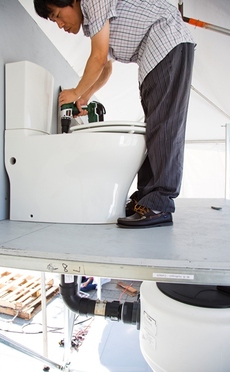Bill Gates lifts lid on solar-powered toilet with $6.5m funding
 People living in the developing world could soon be flushing solar-powered toilets capable of creating hydrogen and electricity from that most renewable of sources – poo.
People living in the developing world could soon be flushing solar-powered toilets capable of creating hydrogen and electricity from that most renewable of sources – poo.Microsoft founder and philanthropist, Bill Gates, yesterday awarded a total of $240,000 (£153,000) in prize money to universities which produced the most impressive concepts for his “Reinventing the Toilet” challenge.
He also handed out a further $3.4m in grants to help develop a series of other clean tech toilet projects, bringing the scheme’s total investment to about $6.5m (£4.1m).
Led by the Bill and Melinda Gates Foundation, the initiative aims to develop new technologies that can improve public health in the developing world where clean water and electricity are not readily available.
Using strict criteria, universities were last year asked to develop prototypes that can capture and process human waste without piped water, access to sewers, or electrical connections, and all at an affordable price.
“The flush toilets we use in the wealthy world are irrelevant, impractical and impossible for 40 per cent of the global population, because they often don’t have access to water, and sewers, electricity, and sewage treatment systems,” said Gates in a blog post.
“Worldwide, there are 2.5 billion people without access to safe sanitation – including one billion people who still defecate out in the open and more than one billion others who must use pit latrines.”
The California Institute of Technology won the top prize of $100,000 for designing a solar-powered toilet, which breaks down waste into hydrogen gas using an electrochemical reactor. The hydrogen can then be stored in fuel cells to provide electricity, while the little water required for the system is pumped underground so it can be reused to flush the toilet.
Britain’s Loughborough University secured the $60,000 second place prize for a toilet that produces biological charcoal, minerals, and clean water, while the University of Toronto won the third place prize of $40,000 for a toilet which cleans human waste and recovers nutrients and clean water.
Gates said he hopes to see some of the new technologies commercialised over the next two to four years.
He also announced $3.4m for other toilet-technology projects being worked on by four organisations as part of the next phase of the Reinventing the Toilet programme.
The winners included Cranfield University in the UK, which was awarded nearly $810,000 to develop a prototype toilet that removes water from human waste and vaporises it using a hand-operated vacuum pump and a membrane system.
Remaining solids are turned into fuel that can also be used as fertilizer, while the water vapour is condensed and can be used for washing, or irrigation.
You can return to the main Market News page, or press the Back button on your browser.

